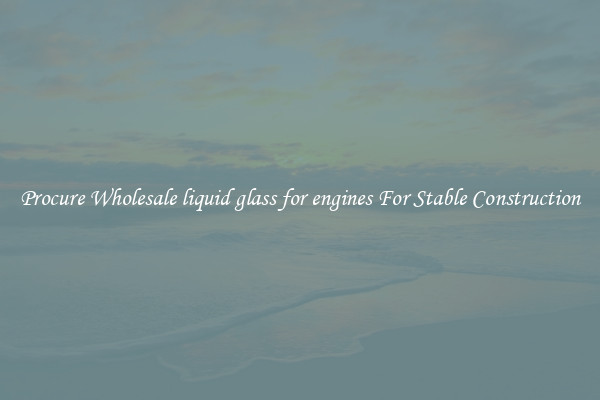Procure Wholesale liquid glass for engines For Stable Construction
Procuring wholesale liquid glass for engines is a smart choice when it comes to ensuring stable construction. Liquid glass, also known as sodium silicate, is a versatile material that is widely used in various industries, including automotive and construction. It has unique properties that make it ideal for engine applications, providing stability and durability to ensure optimal performance.

One of the key advantages of using liquid glass for engine construction is its high temperature resistance. Engines generate a significant amount of heat, and traditional materials may deform or fail under extreme temperature conditions. However, liquid glass can withstand high temperatures without losing its structural integrity. This property makes it suitable for engine components such as cylinder heads, exhaust systems, and coolant passages.
Another important characteristic of liquid glass is its excellent sealing capability. Engines have multiple joints, gaskets, and seals that need to be tightly sealed to prevent leakage of fluids or gases. Liquid glass can form a strong and durable seal when applied to the mating surfaces, ensuring that no leaks occur. This is particularly crucial in engines, as even a minor leak can lead to a loss of efficiency or even catastrophic engine failure.
Furthermore, liquid glass is a cost-effective solution for engine construction. Procuring the material in wholesale quantities allows manufacturers to reduce their overall costs, making it an attractive option for large-scale production. By using liquid glass, engine manufacturers can avoid expensive repairs or replacements due to structural failures, saving both time and money in the long run.
Additionally, liquid glass is chemically stable and resistant to corrosion. Engines are subjected to a variety of fluids and chemicals, including fuel, lubricants, and coolant. These substances can be corrosive and may cause damage to the engine components over time. Liquid glass forms a protective layer on the surfaces it is applied to, preventing corrosion and extending the lifespan of the engine.
In conclusion, procuring wholesale liquid glass for engines is a wise choice for stable construction. Its high temperature resistance, sealing capabilities, cost-effectiveness, and chemical stability make it an ideal material in engine manufacturing. By using liquid glass, engine manufacturers can ensure durable and efficient engines that are capable of withstanding the harsh conditions they are exposed to.

View details

View details

View details

View details








